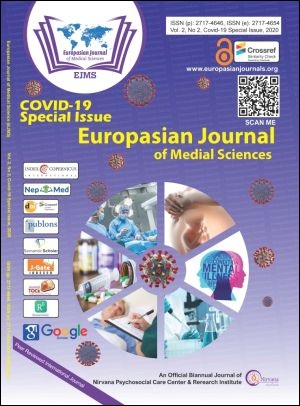Mental Health Status of Nepalese Students during Novel Coronavirus Disease (nCOVID-19) Pandemic
Keywords:
Anxiety, Depression, DAS-21, Mental Health, Stress, Students, YouthAbstract
Background: Since the wave of COVID-19, human life has highly been affected due to government endorsement of containment measures to control the disease. Education system has been held back and students are one of those who are greatly affected. Thus, this study attempts to find out the mental health status of Nepalese students during novel coronavirus Disease (nCOVID-19) pandemic.
Methodology: A web-based cross sectional descriptive study was conducted from 9 May to 29 May 2020 among students of Nepal aged 18 years and above. A structured questionnaire was adopted from DASS-21. The obtained data were entered in Epidata v.3.1. and were analyzed using SPSS version 20. Descriptive frequency, percent and mean were calculated, and chi-square test was performed for bivariate analysis.
Results: The mean age of the study participants was 21.4±2.7 years. This study found optimal mental health status among Nepalese students. Perceived family relationship however, showed statistical significance in all three mental health parameters (p<0.001); depression, anxiety and stress. Depression was found to be comparatively more in females (p<0.05), and those who held Bachelor’s and above degrees have shown presence of anxiety (p<0.05) and stress (p<0.05) relatively than those holding below degrees.
Conclusion: Optimal mental health status among Nepalese students was found during the nationwide lockdown. Perceived family relationship however, showed statistical significance in all three mental health parameters. This is a wake-up call for education system to focus on socio-emotional skills – empathy and solidarity in easing this pandemic crisis confronted by young learners and their families.
Downloads
Downloads
Published
How to Cite
Issue
Section
License
Copyright (c) 2020 Isha Karmacharya

This work is licensed under a Creative Commons Attribution 4.0 International License.
The author(s) retain the ownership of the copyrights for their work published in EJMS without any restrictions. Upon submission, the author(s) grants EJMS a license to publish, including to display, store, copy, and reuse the published content.
License to Publish
By submitting a manuscript to EJMS, the author(s) grant the journal a non-exclusive license to:
- Publish and distribute the content in all formats, media, and platforms (both existing and future), while identifying EJMS as the original publisher.
- Reproduce, display, and store the content in both print and online formats, including institutional and digital repositories.
- Translate, adapt, and summarize the work, including reprints, extracts, and abstracts.
- Develop derivative works based on the original content.
- Include the work in electronic databases and provide links to third-party materials.
Creative Commons Licensing
In addition to EJMS’s publishing rights, authors grant third parties the right to use, share, and distribute their work under the Creative Commons Attribution 4.0 (CC BY 4.0) International License. This allows unrestricted use of the content, provided proper attribution is given to the original author(s) and the journal.

